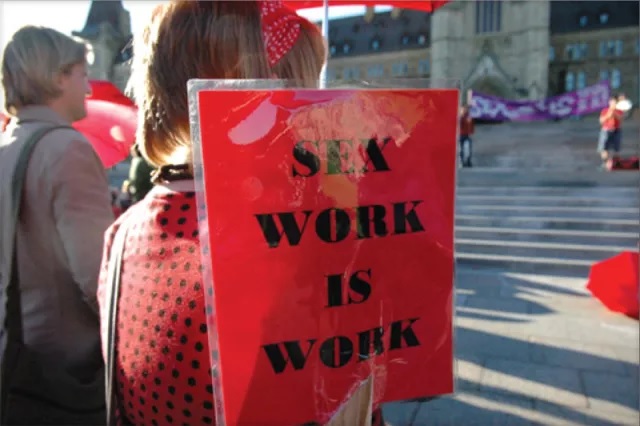A federal judge has asked for additional briefings on a case that raises a profound question – are the laws against prostitution unconstitutional? – and the legal moves indicate that the judge might not dismiss the case outright.
The case was brought by the Erotic Service Providers Union Legal Defense and Research Fund, based in San Francisco, and filed in federal court here. The defendants include San Francisco District Attorney George Gascon and Attorney General Kamala Harris.
Lawyers for the city and the state quickly asked Judge Jeffrey S. White to throw the case out of court, largely on the grounds that the laws against sex work are well established in the US and that any changes would need to come through the legislative process.
But White instead asked for new briefs that discuss the case in the context of the landmark June, 2015 Supreme Court decision legalizing same-sex marriage. That, lawyers for the plaintiffs say, could be an indication that the judge is open to the argument that paid sex between consenting adults, just like same-sex marriage, is protected by the 14th Amendment.
It will be a stretch, of course: While numerous states had already recognized same-sex unions by last summer, prostitution is still illegal in most of the United States.
But H. Louis Sirkin, the lawyer for the erotic service providers, makes a compelling argument (you can read his brief here).
Some of the discussion involves “substantive due process,” a complicated legal term that, in Supreme Court precedent, relates to how much weight the political history of a claim should carry.
Under earlier cases, the Court ruled that “a court will offer protection to a substantive due process right only when it is: (1) carefully defined; and (2) objectively, deeply rooted in this Nation’s history and tradition and implicit in the concept of ordered liberty.”
But the same-sex marriage case took a much broader view: “History and tradition are the starting point but not in all cases the ending point of the substantive due process inquiry.”
And the plaintiffs in this case say that, like same-sex marriage, consensual sex acts that involve the exchange of money are not the business of the State. The fact that elected legislative bodies have outlawed sex work isn’t in any way the end of the story; in fact, the same-sex marriage decision concluded that “the Constitution contemplates that democracy is the appropriate process for change, so long as that process does not abridge fundamental rights.” You can read more about that here.
Sirkin writes:
“The same rationale applies to the present case. Section 647(b) of the California Penal Code infringes upon Plaintiffs’ substantive due process rights. The Plaintiffs need not wait for the democratic process to repeal this statute because this Court is vested with the power to declare the statute unconstitutional.”
Does the right to privacy when it involves intimate relationships, which the Supreme Court has increasingly respected over the years, include the right to pay, or get paid, for sex? If you can assume that all parties to the transaction are in fact legally able to consent – which means nobody is under 18, nobody is a sex slave, nobody is forced into something they don’t want to do – does the State have the right to interfere?
And are the federal courts anywhere even remotely close to that kind of decision?
I hope the case isn’t dismissed, because we ought to have that discussion.





